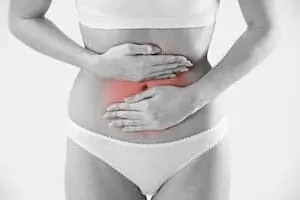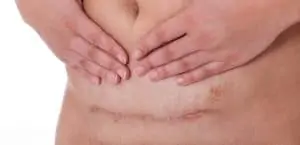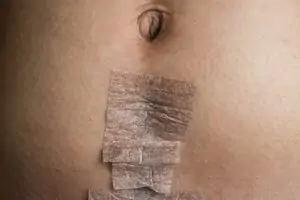I knew that having a c-section would require weeks of recovery, but I didn’t realize that it’s not uncommon for your c-section incision to have a burning sensation months after the surgery.
Everyone talks about the immediate issues that arise from a c-section, but few discuss long-term problems, such as nerve damage after a c-section or internal pain after a c-section. Women experience a range of pains for years afterward.
Seriously!
If you wonder why you have pain after a c-section on your right side, you might have long-term problems from adhesions or nerve pain. Many women complain about nerve pain after a c-section or abdominal numbness.
If you’re suffering from a burning or stinging sensation near your c-section incision, it’s crucial for you to know what causes that feeling and to know that you aren’t alone. As a mother who has had four c-sections, I can assure you that it’s something many women face.
Let’s look at the causes and potential ways to treat this c-section pain.
Why Is My C-Section Incision Burning?
I was concerned when I first noticed that my incision had a burning sensation, so I called my OBGYN. She reassured me that, in most cases, burning or stinging is entirely reasonable. Only in certain circumstances would these sensations indicate an actual problem.
So, what causes a surgical incision to burn or experience discomfort? There are several reasons.
Nerve Damage
The most common reason for the burning is nerve damage. When the surgical team makes the incision, they slice through nerves, and nerves don’t always regrow. It’s a common reason that moms note experiencing c-section incision burning pain.
Nerve damage after a c-section also causes shooting pain, numbness, and temperature sensitivity. When you experience these pains, it’s typically from the ilioinguinal, iliohypogastric, and genitofemoral nerves causing your issues.
The discomfort from these nerves presents itself as a burning pain and hypersensitivity. It might even feel like small electric shocks.
Another reason for nerve pain after a c-section is that the nerves might be bruised, crushed, or trapped under the scar tissue as it forms and heals. Nerve pain can cause pain after a c-section on the right side or both sides.
Nerves take around 6-12 weeks to resolve and heal entirely, but some cases take longer. While the nerve pain after a c-section might start three weeks post-c-section, it also leads to long-term problems, such as numbness near and around the incision site.
I still have no feelings near my incision over two years after my last c-section. So, if you have abdominal pain four months after a c-section, nerve damage is a likely culprit.
Scar Tissue Adhesions

Any surgery can cause adhesions, and cesarean sections aren’t an exception. Women can develop adhesions as they heal and recover from their operation, attaching to organs and ligaments surrounding the incision site.
Then, over time, those adhesions could cause discomfort when you move, exercise, or lose weight. This is why you might notice your c-section incision burning on one side. If that one side has more adhesions, it could cause more discomfort.
I tend to have more burning and pain after my c-section on my left side.
Note that:
Adhesions can be a significant source of discomfort. They can surround the uterus, bladder, and fallopian tubes, causing painful intercourse, frequent urination, and fertility issues. Sometimes, these issues don’t show up until a year or longer after the surgery and can significantly affect your body.
A New Pregnancy
When you become pregnant, your uterus quickly makes room for the new addition. As your uterus grows, it stretches the scar tissue, leading to a burning sensation. It’s not uncommon to notice your c-section scar burning two years later if you become pregnant!
In my experience,
This discomfort goes away after your 16-20th week of pregnancy. By then, the scar has stretched, and the trouble starts to disappear. It’s easy to confuse these pains with round ligament pains that are typical during early pregnancy.
It’s easy to imagine why this can cause burning or stinging. Scar tissue is typically thick and does mobilize well. As your uterus grows, it has to force that dense tissue to stretch, and it’s not always happy to do so at first.
Endometriosis

Although not very common, c-section scar endometriosis is possible, and it occurs when the uterine tissue connects to surrounding organs in your body. It can be excruciating to treat, making conception more troublesome.
Endometriosis can be treated with antibiotics, but since it’s not something doctors diagnose frequently, it can easily be missed. It’s believed that this type of endometriosis might be more common than previously thought. Most women note having a lump that causes pain, such as burning or stinging, and the pain continues to be persistent.
Infection
In some cases, burning or stinging could indicate that your incision is infected. However, if you do have an infection, that is rarely the only sign. You would have other indicators of an infection. Check the list below to ensure you don’t have any other symptoms!
How Long Will My Incision Hurt After a C-Section?
Most of the pain will decrease within two to three weeks after your surgery, but you’ll still have discomfort for eight weeks or longer. The area will be tender. My last c-section was two years ago, and if my kids accidentally press on the area too hard, it does cause discomfort.
However, women report pain for months and even a year afterward. You also might confuse numbness, which can be uncomfortable, with discomfort. It’s quite reasonable for women to experience numbness around their incisions for months or even years!
While some women do have pain for months and years later, it’s important to note that it isn’t normal to do so. It can be tender if pressure is applied, but if you still have burning or stinging, it’s typically an indication that something else is wrong.
Is It Normal to Feel a Burning Sensation After a C-Section?
It can be normal, but if you experience these sensations for longer than eight weeks, there could be a problem. Thousands of women report this same problem, so you aren’t alone.
The most common complaint is that they feel burning or stinging when they lay down or stand up. When you are freshly postpartum, this discomfort could be because you pull and apply pressure to the incision. The stitches pull on a tender area.
This is interesting:
Some report that they have burning on one side, which I also experienced. Surgeons often add what they call a “super stitch” to this area, pulling everything in that direction towards the end of the stitching.
So, it can be normal to feel pulling, stinging, or discomfort. However, that feeling should subside when you’re eight weeks postpartum.
What does this mean for you?
It means that the burning sensation IS normal if it occurs within the first eight weeks of your healing. If you still have this sensation longer, it’s time to talk to your OBGYN.
How Do You Know If Your C-Section Incision is Infected?
A bacterial infection causes most post-surgical incision infections. Burning and stinging CAN be a sign of an infection, but it’s not the only sign. If you experience burning and no other sign of an infection, chances are you are fine, and something else is causing the discomfort.
Here are the most common signs of a surgical incision infection.
- Redness at and around the incision site
- Swelling around the incision
- Pus or discharge that is yellow or green
- Consistent pain that doesn’t go away
- A sudden fever that is higher than 100.4℉
- Painful urination
- Foul-smelling vaginal discharge
- Heavy vaginal bleeding with or without clots
How to Reduce or Prevent Incision Discomfort?
If you’re experiencing burning pain above or around the c-section incision, there might be ways to help reduce your discomfort.
Abdominal Binding
The most common suggestion is for mothers to use abdominal binding to relieve pain and encourage healing. It’s a piece of stretchy material that goes around your midsection. Not only does it help you walk better after any major abdominal surgery, but it can also help with your postoperative pain.
Using binding goes a long way when it comes to preventing incision discomfort. Recovery belly wraps are affordable ways to encourage better healing postpartum.
Use Ice or Heat
One of my fallbacks in any situation is icing or heating the area. If you’re still freshly healing, the area is tender. Try applying some ice or heat to help ease and relax the discomfort you have. If you have swelling during the first week or two, then ice can do wonders to reduce it to a reasonable level.
Try Scar Massage
You can try scar massage, which is called scar tissue mobilization. It’s not like a massage you receive at a spa, but it can help your incision feel better. Studies suggest that 90% of surgical scars can be treated and improved with massages.
When you use scar massages, you help to move around and reorganize the collagen fibers. It helps to make the skin feel and act more like normal tissue, allowing it to stretch more comfortably. Massages reduce adhesions in the connective tissue and layers.
Talk to a Pelvic Floor Therapist
Your OBGYN can help, but you will be amazed at how much an excellent pelvic floor therapist can help you recover. Not only can they help mobilize your scar, but they can show you the right way to try scar massage. If more help is needed, they’ll be able to find you the proper resources as well.
Endometriosis Procedure
If you find out that you have endometriosis, you can seek a medical procedure to remove the tissue causing the problem. Some doctors offer laparoscopic surgery, but you’ll want to speak to your doctor to find out all options.
Get a Nerve Block
If your doctor diagnoses you with nerve damage, little can be done, which is unfortunate because it can be quite uncomfortable. Most specialists recommend that you try a nerve block that leads to temporary numbness in the affected nerve.
Final Thoughts
If you’re experiencing a burning sensation around your c-section incision, you need to know that you aren’t alone. Having nerve pain after a c-section or incision stinging is normal for thousands of mothers. The first step is to identify the cause of your pain, and you might need to seek medical care for that determination.
The good news?
In most cases, your doctor can help you get the relief you need!
Hey, this is Linda. My biggest accomplishment in life is being a mother of four children. Their current ages range from almost ten years old down to 20 months old.
I’m passionate about writing parenting articles because I understand so well all of the problems and trials you face as a parent. From breastfeeding woes to budgeting problems and behavior problems, along with everything in between, chances are I’ve faced it over the last ten years. Read more about Linda here.







I enjoy reading your articles because they cover topics that doctors and surgeons don’t always discuss at length. Do you think the medical community advises women on everything they should expect if they get a c-section? If not, what questions should women ask their doctors if they are getting a c-section?
Thanks for reading, Kelly! I’m so glad you find this information helpful. That’s my goal! To answer, I think some doctors may cover more of those questions better than others. It’s nothing personal against them, but I think many of them do forget that this procedure they perform regularly is very alien to most moms going into it. If you ever encounter one that doesn’t, you can ask them: What can I expect during and after my c-section? How many c-sections do you perform each year? How can I make my recovery easier? When can I eat and drink normally? What am I able to do after my c-section, or how long must I wait to get back to doing the things I normally do? And, of course, ask anything you’re curious about with a c-section because that’s what your doctor is there for – to answer your medical questions openly and honestly.